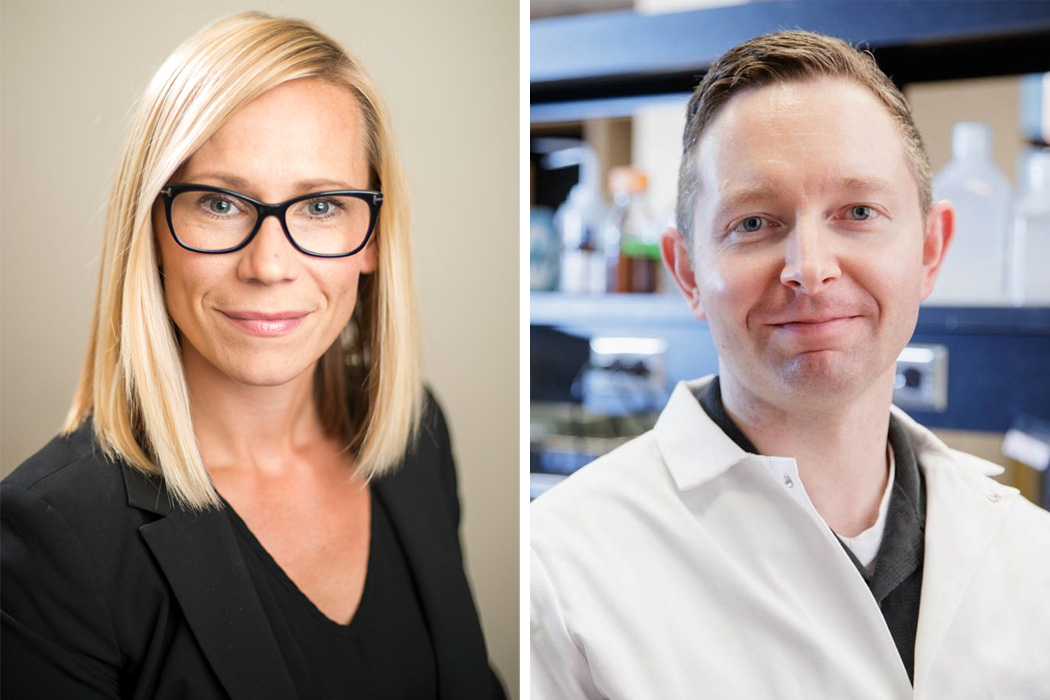
Canadian Cancer Society awards two UM emerging scholars
Two researchers at the Rady Faculty of Health Sciences were among the winners of the Canadian Cancer Society’s 2023 Emerging Scholar Research Grants competition.
Award winners were announced Jan. 15, with Dr. Tara Horrill, assistant professor at the College of Nursing, and, Dr. Joel Pearson, assistant professor of pharmacology and therapeutics at the Max Rady College of Medicine, named among the 16 recipients.
The organization awarded $8.7 million in total across eight provinces.
Horrill received $600,000 for five years for her research to better understand the barriers to accessing timely treatment for socially disadvantaged people living with lung cancer. She is working with a team of researchers from across Canada, including from the University of Manitoba, CancerCare Manitoba, Queen’s University and the University of Victoria.
“Being able to access high-quality cancer treatment in a timely way increases people’s chances of survival. Yet, those who are socioeconomically disadvantaged or living in poverty have difficulty accessing treatment because they are often not referred to a cancer specialist after diagnosis, are unable to access cancer treatment on time or are offered lower-quality treatments,” Horrill said.
Horrill and her research team will listen to the experiences of people with cancer, talk to health-care providers, study medical records and look at strategies used elsewhere to improve access to cancer treatment for similar groups.
“People who are diagnosed with lung cancer often experience a lot of stigma related to their diagnosis because of the fact that smoking is one of the leading causes of lung cancer,” Horrill said. “And when you layer on the stigma that people experience when they are living in poverty, that could be a contributing factor to why we are seeing some of these disparities in treatment.”
She said there can also be challenges with how cancer treatment services are designed or delivered, or policies that are creating barriers for people.
“But we don’t really know, so that is the focus of this project, to examine the underlying reasons. We’re hoping to look at strategies that we could be implemented in Manitoba to address some of the barriers to accessing lung cancer treatment and to improve access to that treatment.”
Pearson, who is also a scientist with the Paul Albrechtsen Research Institute, CancerCare Manitoba, received $550,000 for five years for a study to better understand how lung cancer progresses, specifically small-cell lung cancer (SCLC).
Lung cancer is the leading cause of cancer death in Canada, and SCLC has the worst outcomes, with people with the disease surviving less than one year after diagnosis on average, Pearson said.
“There have been no advancements in the treatments of SCLC, and a big reason is the discovery about the disease has really lagged behind other cancers. We just don’t know enough about the underlying causes of it to develop new treatments,” he said.
Pearson is working with Rady researchers Dr. Shantanu Banerji, Dr. Britt Drögemöller, Dr. David Dawe and Dr. Gefei Qing, along with patient-partner Sandra Swystun. The team is working to better understand how people develop SCLC, how it progresses and how to better treat people living with lung cancer.
The project will investigate why certain lung cancers mutate and form resistance to some of the currently available treatments.
“This could identify new and improved treatments for lung cancer so that people living with this devastating disease will have longer lives and better outcomes,” Pearson said.






